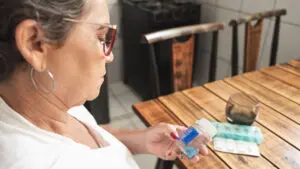Decreased Hospitalizations & ER Visits
The Partner
The University of Pennsylvania School of Nursing (now Mercy LIFE – West Philadelphia, a member of Trinity Health PACE) began a LIFE program in 1998 to serve the needs of the elderly in West Philadelphia, Pennsylvania.
LIFE UPenn currently services 430 members. A unique feature of this program is that the clinical care is primarily Nurse Practitioner driven, with oversight of a Medical Director. LIFE UPenn operates from one PACE center and participants are divided into five teams, including one team for dementia participants.
LIFE UPenn serves as a rotation site for nursing students at UPenn and is continually engaged in research studies. The organization is also designated by the American Nurses Credentialing Center as a “Pathway to Excellence.”
The Challenges
When LIFE UPenn opened in 1998, their medication system was small-scale. By 2012, they realized they had outgrown their medication delivery, packaging, and refill request systems. Members would call to refill medications and a driver would deliver a small tote of medications. As enrollment bolstered to 400 plus members, this system was no longer scalable. Packaging was also a challenge: one med nurse for each team was responsible for pre-pouring medications from vials into pill planners every week. Managing refill requests became difficult because participants often requested “refill all my meds,” resulting in stockpiling of creams and inhalers that weren’t being utilized as prescribed.
Furthermore, clinicians lacked relationships with their pharmacists and often made medication-related decisions independently or by looking up interactions on Epocrates. Despite these challenges, LIFE UPenn staff was hesitant to change pharmacies, as they had become accustomed to work-arounds.
The Transition
Carol Goldring – UPENNIn November of 2013, the UPenn nursing school Board decided to transition to CareKinesis pharmacy, because of their value-added services and their alignment with the schools mission.
During the implementation process, Judy Draper, MSN, CRNP, Care Transitions Coordinator, reviewed all members’ medication profiles, discontinuing 565 medications across the population for an 8% reduction.
Clinical pharmacists at CareKinesis also provided medication recommendations during the transition, a major performance improvement initiative for LIFE UPenn.
The Results
Over the first year of partnership with CareKinesis, LIFE UPenn has realized positive outcomes:
- Reduced on-call medication needs
- Less phone call burden for medication refills
- More informed med decisions with MRM factors
- Greater access to medications through ATM & CPN
- Reduction of in-home dispensing devices, from 52 to 3!
- Reduction in Hospitalizations and ER visits
Judy Draper has been tracking hospitalizations as a key function of her role as Care Transitions Coordinator. When she looked at the hospitalizations from January to September 2014, they were down 14% when compared to hospitalization rates from 2011– 2013! “My role is in ensuring proper in-patient utilization and a smooth discharge process. CareKinesis and the collaboration with clinical pharmacists to reduce the ‘pill burden’ is preventing avoidable hospitalizations in our members,” states Draper.
Conclusion
LIFE UPenn continues to work on performance improvement. Currently they are involved in the CareKinesis Adherence Initiative for Medication Management (AIMM), which involves a nurse-administered questionnaire in the clinic and observational assessment in the home to monitor reported versus actual medication adherence.
To improve medication room operations, Geraldine Woods, RN, in collaboration with nursing students from UPenn and CareKinesis has employed six sigma and lean strategies to reduce distractions and improve interdepartmental communication methods. LIFE UPenn will continue to monitor and report on hospitalization and ER visit trends.



